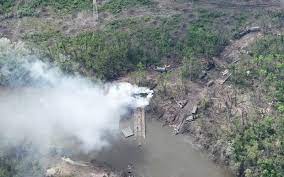According to British sources, Russia lost a large number of troops and vital equipment when Ukrainian forces foiled their effort to bridge a river in the east, adding to Moscow’s struggle to gain decisive victories and salvage a war gone wrong.
Meanwhile, Ukrainian authorities have begun the conflict’s first war crimes trial, which will be closely observed by international monitors anxious to ensure that atrocities are adequately prosecuted. In the early days of the war, a Russian soldier is accused of killing a Ukrainian civilian.
The trial begins as Russia’s war in Ukraine’s Donbas, the country’s eastern industrial heartland, falters.
Ukraine’s airborne forces command has posted photographs of a broken Russian pontoon bridge and many destroyed or damaged Russian military vehicles near the Siversky Donets River. According to Ukrainian press reports, Ukrainian troops prevented Russian passage across the river earlier this week, causing damage to scores of tanks and military equipment or forcing troops to abandon them.
Russia lost “major” portions of at least one battalion tactical group — roughly 1,000 troops — as well as equipment needed to quickly create a temporary floating bridge while attempting to cross the river, according to the British Defense Ministry.
“Conducting river crossings in a contested environment is a very risky tactic,” the ministry noted in its daily intelligence update, “and testifies to the pressure Russian commanders are facing to make headway in their operations in eastern Ukraine.”
Even after shifting troops from other parts of the country to the Donbas, they have struggled, according to the statement.
After his soldiers failed to capture the city, some analysts felt the Donbas campaign would provide President Vladimir Putin with an easier battleground. Rather, Russian and Ukrainian forces have been fighting village by village.
Russian soldiers opened fire 31 times on residential areas the day before, demolishing dozens of homes, including in Hirske and Popasnianska villages, as well as a bridge in Rubizhne, according to the Ukrainian military chief for the eastern Luhansk region.
Meanwhile, Ukrainian officials claimed another victory in the Black Sea, claiming that their forces destroyed another Russian ship, however, Russia has yet to acknowledge the allegation and no deaths have been reported.
When the Vsevolod Bobrov logistics ship was hit while attempting to deliver an anti-aircraft system to Snake Island, it was heavily damaged but not believed to have sunk, according to Oleksiy Arestovych, a Ukrainian presidential adviser.
The Moskva cruiser, Russia’s Black Sea fleet’s flagship, was sunk by the Ukrainian forces in April. It sank the landing ship, Saratov, in March.
Not only has Russia struggled to advance on the battlefield, but the invasion has also given fresh life to NATO’s western alliance, which is set to expand soon.
Finland’s president and the prime minister announced on Thursday that the Nordic country should apply for membership in the military defense pact established in part to fight the Soviet Union as soon as possible.
Although Finland’s Parliament must still weigh-in, the announcement suggests that applying — and being admitted — is all but certain. Sweden is also considering joining NATO’s protection force.
The Kremlin has threatened to retaliate with “military-technical” measures.
Ukraine’s remarkable success in thwarting Russia’s invasion was largely due to NATO members’ help. To punish Russia for the war, Western nations have imposed harsh sanctions, and fury has only grown as reports of crimes perpetrated by Moscow’s troops have surfaced.
According to the prosecutor general, Sgt. Vadim Shyshimarin, 21, was among a group of Russian troops beaten by Ukrainian forces on Feb. 28, four days after Russia invaded Ukraine.
As the Russians escaped, they stopped in a village in the Sumy region, where Shyshimarin is accused of fatally shooting a 62-year-old Ukrainian man. Ukrainian authorities are probing tens of thousands of possible war crimes.
Many of the alleged atrocities were exposed last month as Moscow’s soldiers abandoned their attempt to conquer Kyiv and withdrew from the capital’s outskirts, uncovering mass graves and streets littered with remains in places like Bucha.
Hundreds of journalists, many with cameras, crammed into a small Kyiv courthouse on Friday to witness the opening of the wartime trial. During the 15-minute hearing, the suspect, who was clothed in a blue and gray hoodie and gray trousers, sat in a small glass cage.
Shyshimarin was questioned about his rights and whether he desired a jury trial, among other things. He turned down the latter. His lawyer, Victor Ovsyanikov, admitted that the case against him is strong, but said the court in Kyiv would make the final decision on what evidence to allow. The lawyer has not stated what kind of defense he will present.
Shyshimarin, a member of a tank battalion seized by Ukrainian forces, claimed in a video released by the Ukrainian Security Service that he shot the civilian because he was commanded to do so.
Teachers were attempting to reestablish some semblance of normalcy as the war continued to close Ukraine’s schools and destroy the lives of millions of children. Lessons are being offered in a subway station repurposed as a bomb shelter in Kharkiv, Ukraine’s second-largest city that has become home to numerous families.
“It gives them mental support.” Because there is a conflict now, and many people have lost their houses… some people’s parents are now fighting,” said Valeriy Leiko, a teacher. “They feel that someone loves them,” he said, in part because of the lessons.
In the subway station, where children’s artworks now line the walls, primary school-aged youngsters joined Leiko around a table for history and art classes.
Anna Fedoryaka, an older student, watched online lectures on Ukrainian literature delivered by Kharkiv professor Mykhailo Spodarets from his basement.
Some people had trouble connecting to the internet, according to Fedoryaka. “It’s difficult to concentrate on your homework when there are explosions outside your window,” she adds.

















